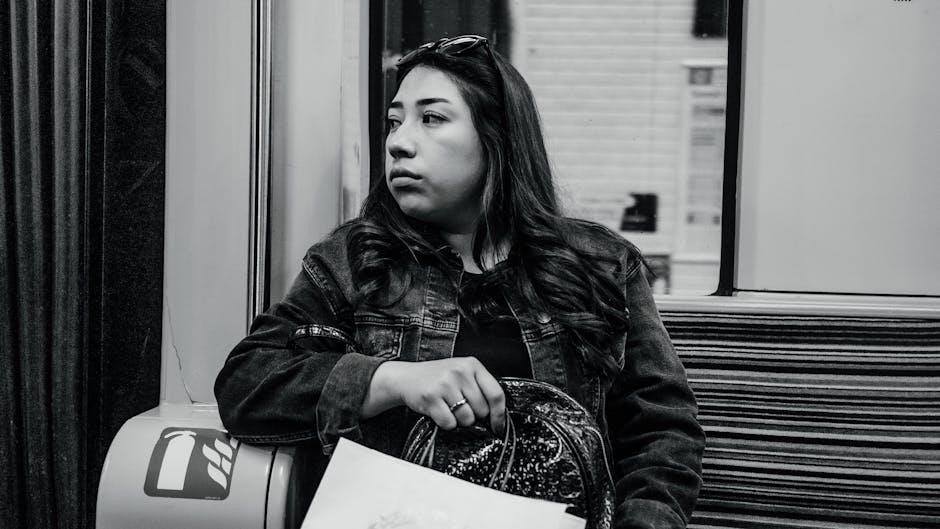waiting for godot pdf act 2

Overview of Act 2 in Waiting for Godot
Act 2 unfolds the next day, same time and place, with Estragon barefoot and Vladimir agitated. Pozzo and Lucky return, now blind and mute, deepening the absurdity. The tree bears leaves, symbolizing subtle change, while Vladimir and Estragon’s cyclical wait continues, reflecting existential despair and the futility of their endeavor.
Setting and Context
Act 2 takes place the next day, at the same time and location as Act 1—a desolate country road with a tree. Estragon enters barefoot, while Vladimir is agitated. The tree now has four or five leaves, symbolizing subtle change. The setting remains minimalist, emphasizing the characters’ enduring wait and existential isolation.
Key Character Interactions
Vladimir and Estragon reunite, with Estragon barefoot and distressed. Their interactions highlight their dependency and comforting routines. Pozzo and Lucky reappear, now blind and mute, further emphasizing the absurdity. Vladimir’s agitation contrasts with Estragon’s resignation, deepening their tragicomedy. The characters’ exchanges reveal existential despair and the futility of their wait, underscoring the play’s themes of hopelessness and interdependency.
Plot Development and Structure
Act 2 mirrors Act 1 in structure, with the same setting and time. The tree now has leaves, symbolizing subtle change. Estragon enters barefoot, highlighting his ongoing struggles. Vladimir’s agitated movements and dialogue reflect his growing frustration. Pozzo and Lucky reappear, with Pozzo now blind and Lucky mute, deepening the absurdity. A boy’s brief appearance hints at Godot but offers no resolution. The repetition of dialogue and actions underscores the cyclical nature of their wait, emphasizing themes of time, futility, and existential crisis.
Themes and Motifs in Act 2
Existential despair and absurdity dominate, with waiting as a central motif. The tree’s leaves symbolize subtle change, while Estragon’s bare feet and Pozzo’s blindness highlight human struggle.
The Absurd and Existentialism
Act 2 amplifies existential despair through absurd scenarios. Pozzo’s blindness and Lucky’s muteness symbolize humanity’s helplessness. Vladimir and Estragon’s futile waiting embodies existential futility, as the tree’s leaves mock their stagnant lives. The cyclical nature of their actions underscores the meaninglessness of existence, while their struggles, like Estragon’s bare feet, highlight the absurdity of human suffering and the search for purpose in a seemingly indifferent world.
Waiting as a Central Theme
Waiting dominates Act 2, as Vladimir and Estragon remain trapped in their endless cycle. Estragon’s bare feet and Vladimir’s agitation highlight their plight. The tree’s new leaves mock their stagnant existence, emphasizing time’s passage without progress. Their dependence on each other underscores the futility of their wait, blending absurdity with poignant human connection, as they cling to hope despite the certainty of Godot’s absence.
Recurring Dialogue and Repetition
Act 2 mirrors Act 1 through repetitive dialogue, emphasizing the cyclical nature of existence. Estragon’s “Nothing to be done” and Vladimir’s “We wait, we are waiting” echo hopelessly; Their exchanges about waiting, thinking, and physical struggles recur, underscoring futility. Pozzo and Lucky’s return with altered circumstances—Pozzo now blind and Lucky mute—highlights the absurdity of repetition without progress, reinforcing the play’s existential themes of time, memory, and stagnation;

Symbolism in Act 2
The tree, now bearing leaves, symbolizes subtle change amidst stagnation. Estragon’s boots, left behind, represent his ongoing struggle and the cyclical nature of their waiting. Pozzo’s blindness and Lucky’s muteness deepen the absurdity, while their return underscores the futility of their existence.
The Tree as a Symbol
The tree in Act 2 bears four or five leaves, symbolizing subtle change and enduring life amidst the characters’ stagnant existence. Its minimal transformation contrasts with the cycle of waiting, reflecting both hope and despair. Often interpreted as a symbol of divine presence or the cross, the tree’s resilience underscores the duality of existential struggle and the futility of waiting for meaning in a seemingly indifferent world.
Boots and Physical Struggles
Estragon’s boots, left on the ground, symbolize his ongoing physical and emotional struggles. Barefoot and bowed, he embodies vulnerability, while Vladimir’s examination of the boots highlights their mutual dependence. The boots’ presence underscores the futility of their situation, as they remain stuck in a cycle of waiting. This physical struggle mirrors their existential plight, emphasizing the absurdity of their repetitive, unchanging existence.
Character Analysis in Act 2
Vladimir and Estragon’s interdependence deepens, revealing their emotional fragility. Pozzo’s transformation to blindness and Lucky’s muteness highlight their deteriorating conditions, emphasizing existential struggles and absurdity.
Vladimir and Estragon’s Relationship
Vladimir and Estragon’s bond deepens in Act 2, showcasing their interdependence. Vladimir’s agitation contrasts with Estragon’s despair, yet they find moments of tenderness. Their interactions highlight emotional support amid existential uncertainty, reinforcing their connection as a source of comfort in a meaningless world.
Pozzo and Lucky’s Transformation
Pozzo and Lucky undergo a striking transformation in Act 2. Pozzo, now blind, loses his former authority, while Lucky, once verbose, becomes mute. Their altered dynamic reflects the play’s absurdity and the inevitability of decay. Pozzo’s blindness and Lucky’s silence symbolize the loss of meaning and control, highlighting the futility of existence.

Tragicomedy in Act 2
Act 2 blends humor and despair, as Vladimir and Estragon’s absurd struggles continue. Pozzo’s blindness and Lucky’s muteness add tragic depth, contrasting with comedic moments of their repetitive, futile existence.
Humor and Pathos
Act 2 juxtaposes humor with emotional depth, as Estragon’s struggles with boots and Vladimir’s witty remarks provide comic relief. Yet, the characters’ desperation and Pozzo’s transformation into a blind man evoke pathos, highlighting the absurdity and futility of their existence while deepening the emotional resonance of their plight.
Contrasting Tones
Act 2 masterfully blends tragic and comedic elements, creating a rich emotional landscape. The humor arises from Estragon’s boot struggles and Vladimir’s absurd antics, while pathos emerges through Pozzo’s blindness and Lucky’s silence. These contrasting tones underscore the play’s absurdity, deepening the sense of existential despair and the futility of the characters’ waiting, while also highlighting their resilience and humanity.

Significance of Act 2
Act 2 deepens the play’s existential themes, mirroring Act 1’s structure to emphasize cyclical futility. It underscores the absurdity of waiting and the characters’ unresolved hopelessness, while Pozzo and Lucky’s transformations highlight the inevitability of decline and the search for meaning in a seemingly meaningless world.
Reflection of Act 1
Act 2 mirrors Act 1 in structure and themes, with Vladimir and Estragon repeating their wait for Godot. Pozzo and Lucky reappear, but their conditions worsen, reflecting existential decay. The tree now has leaves, symbolizing subtle change, yet the characters’ cycles of hope and despair remain unbroken, underscoring the futility of their existence and the absurdity of their endless waiting.
Buildup to the Play’s Climax
Act 2 escalates tension as Vladimir and Estragon’s desperation intensifies, hinting at the approaching climax. Pozzo’s blindness and Lucky’s muteness deepen the sense of irreversible decline, while the tree’s leaves symbolize fleeting hope. The characters’ interactions become more frantic, foreshadowing the inevitable realization that Godot may never arrive, leaving them trapped in their endless cycle of waiting and existential despair.

Religious and Philosophical Undertones
Act 2 explores existential themes through the tree, symbolizing the cross, and Lucky’s cryptic allusions to divine existence, blending absurdity with profound philosophical questioning.
Godot as a Metaphor
Godot symbolizes the elusive and unknowable, embodying existential longing; In Act 2, the tree’s leaves suggest a subtle, enigmatic change, mirroring the futility of waiting. Godot represents the unattainable, reflecting humanity’s search for meaning in an indifferent universe. The characters’ persistent yet futile anticipation underscores the absurdity of seeking definitive answers, leaving Godot as an eternal, haunting metaphor for the incomprehensible.
Existential Crises and Hope
Act 2 deepens the existential struggle as Vladimir and Estragon confront the futility of their wait. Vladimir clings to hope, seeking meaning in their perseverance, while Estragon succumbs to despair. Their interactions reveal a fragile dependency, offering moments of tenderness amidst the absurdity. Though their situation remains unchanged, their resilience hints at a stubborn, albeit faint, hope, underscoring the human condition’s complexity in the face of uncertainty and despair.
Structure and Repetition
Act 2 mirrors Act 1 in structure, with identical setting and repeated actions, reinforcing the cyclical nature of the characters’ existence and the futility of their waiting.
Mirroring Act 1
Act 2 replicates Act 1’s structure, with the same setting and time, emphasizing cyclical repetition. Estragon reappears barefoot, and Pozzo and Lucky return, now blind and mute, deepening the absurdity. Vladimir and Estragon’s dialogue echoes previous exchanges, while the tree’s subtle change, with leaves now present, contrasts with their unchanging plight. This mirroring underscores the futility of their wait and the inevitability of their existential loop.
Time and Place Consistency
Act 2 occurs the next day, at the same time and location, maintaining continuity. The setting remains unchanged, with Estragon’s boots still present, emphasizing the static nature of their existence. The tree, now bearing leaves, subtly indicates time’s passage, yet the characters’ circumstances remain unaltered. This consistency underscores the cyclical and endless nature of their wait, reinforcing the play’s existential themes of time, place, and the futility of change.
Act 2 reinforces the play’s central themes of existential waiting and futility. The cyclical nature of the characters’ situations underscores the absurdity of their endless, unresolved wait for Godot.
Final Thoughts on Act 2
Act 2 deepens the existential despair and absurdity, mirroring Act 1’s structure but intensifying the characters’ emotional struggles. The return of Pozzo and Lucky, now blind and mute, highlights the futility of waiting. Estragon’s barefoot state and Vladimir’s agitation underscore their relentless cycle of hope and despair. The tree’s subtle change, with leaves appearing, symbolizes the passage of time without progress. The act leaves audiences contemplating the meaninglessness of their wait, reinforcing the play’s central themes of absurdity and existential crisis.
Impact on the Play’s Overall Message
Act 2 reinforces the play’s central themes of absurdity, existential despair, and the futility of waiting. The transformation of Pozzo and Lucky, along with Estragon’s barefoot state and Vladimir’s agitation, underscores the cyclical nature of their existence. The tree’s subtle change, now bearing leaves, symbolizes time’s passage without progress. These elements collectively deepen the audience’s understanding of the meaningless wait, emphasizing the absurdity of human existence and the search for meaning in a seemingly indifferent world.
Leave a Reply
You must be logged in to post a comment.